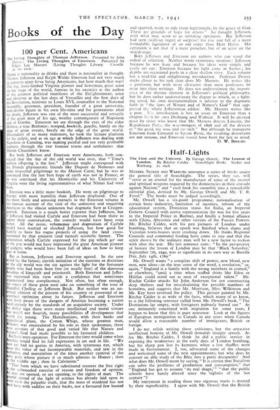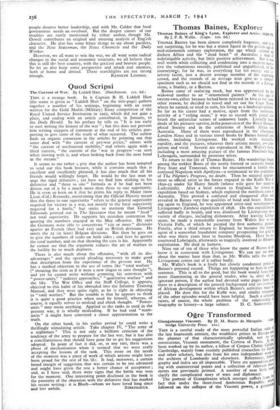Half-Lights
The Lion and the Unicorn. By George Orwell, The Lesson of London. By Ritchie Calder. 'Searchlight Books Seeker and Warburg. zs. each
MESSRS. SECKER AND WARBURG announce a series of books under the general title of Searchlight. The series, they say, will "serve as an arsenal for the manufacture of some of the mental and spiritual weapons required by the democracies in their crusade against Nazism," and "each book fits smoothly into a remarkable editorial plan, devised by Mr. George Orwell and Mr. T. R. Fyvel." The books must be judged accordingly.
Mr. Orwell has a six-point programme, nationalisation of certain basic industries, limitation of incomes, reform of the educational system, Dominion status for India, an Imperial Genera' Council with native representation (he was for five years in the Imperial Police in Burma), and finally a formal alliance with China, Abyssinia and other victims of the Fascist Powers. Mr. Ritchie Calder, with his pen pictures of London under bombing, believes that an epoch was finished when slums and Victorian town-houses went crashing down. He thinks Regional Councils and communal feeding have come to stay and that the spirit shown by the ordinary man will be a new factor to reckon with after the war. His last sentence runs: "In the perspective of history the lesson of London may be that 'Black Saturday,' September 7th, 1940, was as significant in its own way as Bastille Day, July 14th, 1789."
Mr. Orwell wants "a complete shift of power, new blood, new men, new ideas—in the true sense of the word, a revolution," or, again, "England is a family with the wrong members in control," or elsewhere, "until a time when stuffed shirts like Eden or Halifax could stand out as men of exceptional talent." Mr. Ritchie Calder attacks Sir John Anderson for not constructing deep shelters and for miscalculating the possible numbers of homeless, and suggests that Mr. Morrison, Miss Wilkinson and Mr. Key have reversed the policy. This picture painted by Mr. Ritchie Calder is as wide of the facts, which many of us know, as is the following sentence culled from Mr. Orwell's book, "The Dominions lay empty, with foreigners jealously barred out." As one intimately concerned with migration for some years, I happen to know that this is pure nonsense. Look at the figures of European immigration to Canada in any years when Canada would allow a reasonable number of immigrants, British or foreign.
I do not relish writing these criticisms, but the attractive intellectual honesty of Mr. Orwell demands straight speech. As for Mr. Ritchie Calder, I think he did a public service in exposing the weaknesses in the early days of London bombing, but his sharp pen lost its keenness when a few shuffles were made in Government. I, too, advocated some of the changes and welcomed some of the new appointments; but why does he convert an able study of the Blitz into a party document? And what does Mr. Orwell mean by saying, "It is certain that Socialism can solve the problems of production and consumption," that "England has got to assume 'its real shape,'" "that the public schools have barely altered since the 'eighties of the last century "?
My enjoyment in reading these two vigorous tracts is marred by their superficiality. I agree with Mr. Orwell that the British
people deserve better leadership, and with Mr. Calder that local government needs an overhaul. But the deeper causes of our troubles are rarely mentioned by either author, though Mr. Orwell contributes an original and amusing analysis of English character. He also has some bitter things to say about pacifists, and the New Statesman, the News Chronicle and the Daily Worker.
However, we all want to win the war, we all want some radical changes in the social and economic structure, we all believe that this is still the best country, with the gem:est and bravest people. So let us also keep some perspective and attack real enemies, both at home and abroad. These searchlights are not strong































 Previous page
Previous page